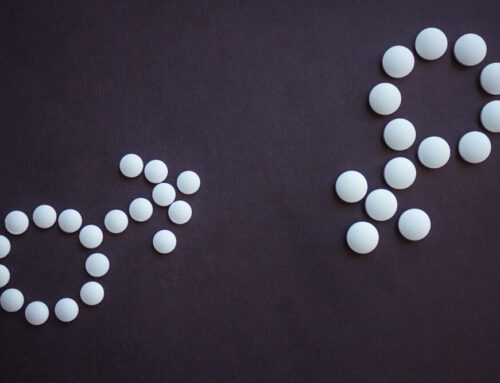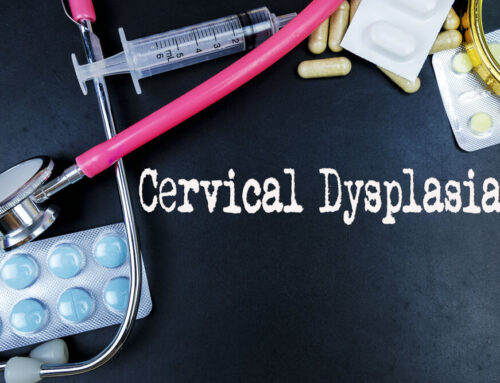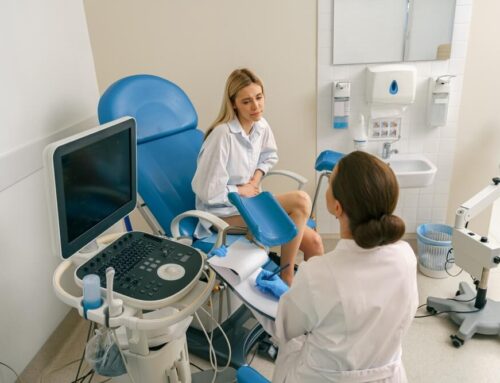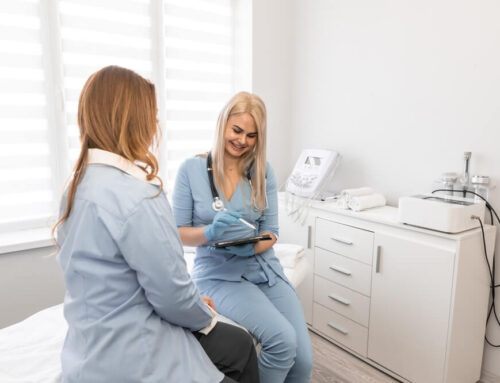Vaginal bleeding can be stopped with a treatment called uterine artery embolization (UAE). UAE is non-invasive and effective because it cuts off the uterus’s blood supply.
The most common reasons for vaginal bleeding are uterine fibroids, trauma-caused heavy bleeding situations, postpartum hemorrhage, and cancerous gynecological tumors.
Approximately 40 to 80% of people have fibroids. They represent noncancerous growths inside the uterus; in some cases, people don’t even know they have them because they don’t experience any symptoms.
Don’t hesitate to make the most out of professional gynecological care in Margate, Florida, if you have health concerns. We’ve been around for almost 20 years as a women-only OB/GYN practice and are quite proud of the peaceful and reassuring environment we have created for all of our pregnant patients.
Why Undergo Uterine Artery Embolization (UAE)?

The biggest reason for a patient to need uterine artery embolization (UAE) procedure is uterine fibroids, which can lead to numerous symptoms such as:
- Heavy periods: This is a common disorder among women, and it indicates bleeding that lasts longer than seven days and involves more blood flow than is typical during menstruation.
- Painful sexual intercourse (Dyspareunia): Dyspareunia refers to pain in the genital area that can occur during or after sexual intercourse. Feeling pain constantly during intercourse can lead to more health problems, which is why it requires immediate action.
- Constant urination: The presence of uterine fibroids can put pressure on your bladder, resulting in frequent urination.
- Chronic vaginal discharge: Vaginal discharge is a whitish or clear fluid from your vagina. It is perfectly normal, but sudden consistency, smell, color, or amount changes could indicate a potential health issue or an infection.
- Low back pain: Lower back pain is widespread, but not many people think that uterine fibroids may be the source of the discomfort.
Many more symptoms and causes may warrant uterine artery embolization. Still, healthcare providers won’t recommend the intervention in the following cases:
- If you are pregnant
- If you are allergic to anything used in the UAE procedure
- You have uterine fibroids without symptoms
You may also be advised to get uterine artery embolization after childbirth, excessive bleeding due to trauma, or malignant tumors.
How to Prepare for and What to Expect From Uterine Artery Embolization?
Thorough preparation for any kind of procedure beforehand is always advised. If you need to get a UAE procedure, your doctor will provide you with all the necessary information you need, but here are the main things you should know:
- You will undergo a thorough medical history check and evaluation, so your doctor can have all the information necessary for the uterine artery embolization procedure to go as planned.
- Several diagnostic procedures, such as hysteroscopy, magnetic resonance imaging (MRI), or ultrasound of the uterus, may be done to determine the source of the bleeding. Also, a biopsy may be performed to rule out cancer.
- Before having the UAE procedure, you will be asked to stop taking your medication, such as nonsteroidal anti-inflammatory drugs, blood thinners, and aspirin. You will also be permitted any food or drinks right before the procedure, but the exact diet will be provided to you by your doctor.
The UAE procedure is performed by an interventional radiologist who works together with your gynecologist. The intervention requires conscious sedation to help you relax. It cuts off blood flow to the fibroids, striping them of nutrients and oxygen and causing them to shrink. The entire uterine artery embolization procedure usually takes about 90 minutes and does not require a post-op hospital stay.
The Recovery Process
Since uterine artery embolization is typically outpatient, most people can go home after a couple of hours. After UAE is done, you may be advised to rest for a couple of hours, and if necessary, your doctor will prescribe antibiotics or pain meds to take home.
Some changes to your body may be visible, such as mucus-like or watery discharge, pelvic cramps, and irregular menstrual cycles. Still, all this is normal and expected, and you should not worry. The uterine artery embolization procedure is not painful, thanks to the sedation, but you may feel slight discomfort after the sedatives wear off.
How Safe Is the Uterine Artery Embolization (UAE) Procedure?
In most cases, uterine artery embolization is safe. Based on the tests and your medical history, your doctor will evaluate if you are a fit candidate to undergo UAE, and they will explain all the risks to you in advance.
Although this procedure is considered safe, there are some concerns about whether you should have it while pregnant or planning to have children in the future. Some believe that pregnancies after the UAE procedure have higher rates of miscarriage, with potential cesarean section and postpartum hemorrhage. If this concerns you, we advise you to talk to your doctor.
What Are the Advantages of Uterine Artery Embolization?
A routine procedure like this can be done under sedation with just a tiny puncture, which means you will be back on your feet in no time. With this in mind, you will also avoid other, more invasive treatments like a myomectomy (surgical fibroid removal) or hysterectomy (complete uterus removal).
What Are the Disadvantages of Uterine Artery Embolization?

As is the case with all medical procedures, UAE also has its risks. During the intervention, an infection may occur, and if not adequately examined beforehand, the patient can have an allergic reaction. Other risks include injury to healthy tissue, lack of menstrual period, and in extreme cases, infertility.
To conclude
Jean-Jacques Merland performed the first successful uterine artery embolization in 1974. Since then, many women have undergone this procedure and were relieved from pain and discomfort soon after.
Uterine fibroids may be relatively common, but they’re also the main reason women undergo the UAE procedure. Heavy or abnormal vaginal bleeding can affect your daily routines, interfere with sleep, and make it difficult for you to participate in everyday social activities.
Now we would like to hear from you. What are your thoughts on this matter?
If you want to learn more about the uterine artery embolization procedure, feel free to reach out to Fern F. Taisenchoy-Bent, MD, LLC. Our highly trained and experienced specialists can address your gynecological concerns and provide you with care and education on female health and well-being.
Over the past decade, there has been significant development in gynecological surgeries and techniques. Our clinic is equipped to handle a wide range of minimally invasive procedures. Even if you are unfamiliar with the specificities of UAE, don’t hesitate to ask us everything you want to know.










